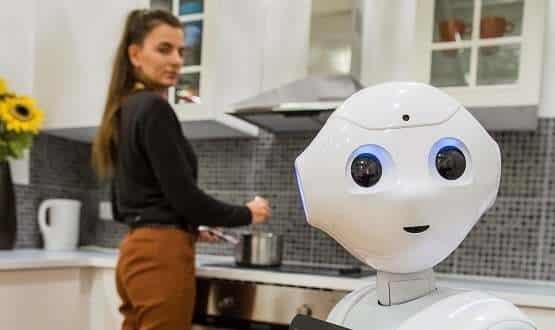New partnership to explore use of robots at North Bristol NHS Trust
- 30 January 2020

North Bristol NHS Trust (NBT) and the Bristol Robotics Laboratory at the University of the West of England (UWE Bristol) are collaborating on the development of robotics to improve patients’ experience of hospital.
The NBT/UWE Health Technology partnership will explore how emerging technologies, including artificial intelligence (AI), machine learning and ‘smart’ assistive robots, could be used to better support patients, either at home or in the hospital.
It also aims to determine the potential for robotics that can assist clinicians in their day-to-day duties, such as providing additional check-ups on patients throughout the day or bringing them food.
The partnership will facilitate joint research and learning, and new technology will be trialled with both patients and care staff.
Professor Praminda Caleb-Solly, leading research in assistive robotics and intelligent health technologies at Bristol Robotics Laboratory, said: “Robotics can enable a more effective use of the existing workforce, allowing humans to give the human contact and robots to be used as smart tools to support and complement their work.
“As such, they can improve the value that is added beyond what is currently available.
“Hospitals are likely to be the first adopters of this type of technology so it will be beneficial to test our prototype in a hospital setting and work with hospital staff in shaping it.
“Through this partnership, we can have a more clinically-informed focus to our research and make it more relevant to the specific needs of the patients and NHS staff.”
Do the robot
Southmead Hospital already makes widespread use of robotics, harnessing it to conduct cancer surgery, dispense pharmacy medicines, analyse blood samples and transport supplies around the wards.
Clinicians are also exploring the introduction of an algorithm to predict seasonal variations in admissions to the emergency department, as well as AI-assisted reading of breast mammograms and decision-making on prostate cancer.
“Southmead is one of the UK’s pioneering hospitals in its approach to technology, with robots already in use to transport supplies and support more efficient surgical procedures. This partnership will build on that impressive work,” Caleb-Solly said.
“By bringing together the university’s research expertise and the hospital’s clinical expertise we can create a leading centre for healthcare technology.”
The partnership will also see hospital staff support academic research projects such as CHIRON, which is designed to support older people with mobility issues and age-related impairments.
Bristol Robotics Laboratory (BRL) has already developed a “socially intelligent” robotic fitness coach designed to guide people through exercise regimes using motivational prompts. It is hoped technology similar to this could be used to help patients with mobility problems.
Southmead Hospital hopes to play a central role in shaping the design of the technology and safety-testing it, to ensure it fits in with clinical procedures and practices.
Tim Whittlestone, NBT clinical director for anaesthesia, surgery, critical care and renal, said: “We have an ageing population requiring ever more complex treatment. Technology gives our growing workforce massive opportunities to manage this and improve care.
“Robots can help us do some of the more mundane, repeatable tasks and free up staff to do what they do best – listening, thinking and caring. They can also analyse data, helping us to really personalise treatment, care and recovery.
“There are constant developments so we need work out how patients and staff interact with the technology and whether it’s useful.”




